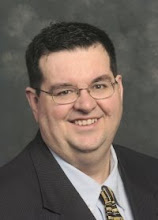Un-Broke: The Seth Green Cribs Edition - watch more funny videos
Real Estate Report 2024
4 months ago
 Our first Financial Peace University (FPU) class is in the books, and it was a good one on "Super Saving." We learned the importance of having an emergency fund in place, because emergencies will happen.
Our first Financial Peace University (FPU) class is in the books, and it was a good one on "Super Saving." We learned the importance of having an emergency fund in place, because emergencies will happen. Joe Boyd, a pastor in the Cincinnati area and a former classmate of Wendi at Cincinnati Christian University, recently completed Dave Ramsey's Financial Peace University.
Joe Boyd, a pastor in the Cincinnati area and a former classmate of Wendi at Cincinnati Christian University, recently completed Dave Ramsey's Financial Peace University.Debbie and I began Financial Peace University (Dave Ramsey) back in January. We just finished the last of the thirteen weeks today. There was a time in my life when I would not have been in the state of mind to embrace something like FPU. Ramsey is great at what he does, but he's not exactly my preferred style of teacher. I'm also hardwired to react negatively to any "system" that claims to change your life. No system works all the time and sometimes systems used improperly can cause more hard than good. To top it off, I have a hunch that Dave Ramsey and myself may have different political and theological positions on more than a few issues.
 Have you ever considered growing your own food? If so, here are some links to help you grow your own vegetables, like tomatoes and potatoes.
Have you ever considered growing your own food? If so, here are some links to help you grow your own vegetables, like tomatoes and potatoes. Marilyn and Dean report even more families have signed up for the Dave Ramsey class. We hope to have our order placed by Tuesday. Talked with others who have led Financial Peace University classes, and they tell me having about 25 families for the first offering is a good turnout. I thought so, too.
Marilyn and Dean report even more families have signed up for the Dave Ramsey class. We hope to have our order placed by Tuesday. Talked with others who have led Financial Peace University classes, and they tell me having about 25 families for the first offering is a good turnout. I thought so, too. What a great turnout for our free preview of the Dave Ramsey Financial Peace University class we are beginning at Parkview. Counting those who already signed up (and paid) and those who are still thinking it over, we could have about 25 families participating.
What a great turnout for our free preview of the Dave Ramsey Financial Peace University class we are beginning at Parkview. Counting those who already signed up (and paid) and those who are still thinking it over, we could have about 25 families participating.I joined Financial Peace University in May of 2007 at my church. I am a single mom with 3 teenage boys. In 90 days, I was able to pay off over $2700 in credit card debt; which eliminated my debt and save over $1800.
I did this by putting ALL of the principles I learned into place and not only did I tithe, but I gave over my tithe each month. I got rid of all my credit cards and now pay only cash for everything.
It's been almost a year now and things are going great! I led the next FPU class at our church and am now leading our senior high students in "Next Generation".
In November, I met a widower with 3 boys of his own and he is so much like Dave Ramsey, it's scary! HA! He, too, is debt free (except his mortgage). We are planning a July wedding and from the sale of his house, we'll have a fully funded emergency fund and be able to make a huge principal payment on my house and be have our final debt paid off, our house, in 3 years! FREEDOM! We are in our mid-40's.
I am not tooting my own horn, but rather praising God for his promises. He truly does honor obedience over sacrifice. And he has given me "exceedingly, abundantly more than I could ever ask or imagine." Think about it....we will have 6 boys altogether and we already have a fully funded emergency fund, college tuition set aside, all cars paid for, no credit card debt AND our house will be paid off in 3 years before we are 50!! That blows my mind!!!
God is so good. It truly pays to "Act Your Wage". Thanks for all you do Dave!
 Wendi and I paid off our 2001 Jeep Cherokee on Friday, April 3, 2009 - 20 months early!
Wendi and I paid off our 2001 Jeep Cherokee on Friday, April 3, 2009 - 20 months early!
